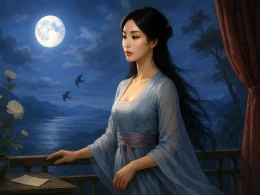I dismount from my horse and I offer you wine,
And I ask you where you are going and why.
And you answer: "I am discontent
And would rest at the foot of the southern mountain.
So give me leave and ask me no questions.
White clouds pass there without end."
Original Poem
「送别」
王维
下马饮君酒,问君何所之。
君言不得意,归卧南山陲。
但去莫复闻,白云无尽时。
Interpretation
This poem was composed by Wang Wei upon his friend's retreat into seclusion, expressing both understanding of this decision and his own yearning for reclusive life. Though seemingly plain in diction, it carries profound emotions, revealing the poet's indifference to fame and fortune while celebrating the freedom of hermetic existence.
First Couplet: "下马饮君酒,问君何所之。"
Xià mǎ yǐn jūn jiǔ, wèn jūn hé suǒ zhī.
Dismount to share your wine, then ask: "My friend, where will you go?"
These opening lines initiate conversation through a wine-sharing gesture. Superficially a farewell drink, the question "where will you go?" conveys deep concern for the friend's future while subtly introducing the theme of reclusion.
Second Couplet: "君言不得意,归卧南山陲。"
Jūn yán bùdéyì, guī wò Nánshān chuí.
You sigh of thwarted hopes: "I'll rest by Southern Mountains' side."
The friend's reply cites "thwarted hopes" as reason for retreating to Zhongnan Mountain. While phrased simply, these words contain layers of disappointment and resignation, met with the poet's silent empathy.
Third Couplet: "但去莫复问,白云无尽时。"
Dàn qù mò fù wèn, báiyún wújìn shí.
"Go then—no further questions—where white clouds drift without end."
Here the poet offers ultimate support for his friend's choice. The "endless white clouds" symbolize both the friend's future freedom and Wang Wei's own longing for such unfettered existence—nature's purity contrasting with worldly frustrations.
Holistic Appreciation
This deceptively simple poem conveys complex emotions through understated dialogue and natural imagery. Wang Wei avoids dramatic farewells, instead using casual wine-sharing to explore themes of reclusion. The friend's confession of "thwarted hopes" receives neither judgment nor consolation, only the poet's quiet acceptance encapsulated in the cloud imagery—a masterstroke suggesting infinite spiritual liberation beyond human queries.
Artistic Merits
Wang Wei employs simple dialogue and natural imagery to convey profound emotions in this poem. The poet begins with an ordinary scene - "dismount to share your wine" - and through seemingly mundane questions and answers, artfully expresses his understanding and support for his friend's choice of reclusion. The line "where white clouds drift without end" further reveals, through natural imagery, the poet's own yearning for hermitic life and his detachment from worldly affairs.
With concise yet philosophical language, the poet expresses delicate and sincere emotions. Though devoid of ornate rhetoric, the poem moves readers through its depiction of natural scenery and economical expression. Through this understated narrative, Wang Wei demonstrates his profound contemplation of life, particularly the emotional conflict and choice between reclusion and worldly success.
Insights
This poem reminds us that profound emotions can be expressed through simple words without ornate rhetoric. By conveying inner contemplation through natural imagery and everyday dialogue, the poet demonstrates a serene and unhurried approach to life. The symbolic "endless white clouds" impart a philosophy of freedom and reclusion, inspiring us to cherish inner tranquility and liberty while pursuing material gains and worldly success.
Poem translator
Kiang Kanghu
About the poet

Wang Wei (王维), 701 - 761 A.D., was a native of Yuncheng, Shanxi Province. Wang Wei was a poet of landscape and idylls. His poems of landscape and idylls, with far-reaching images and mysterious meanings, were widely loved by readers in later generations, but Wang Wei never really became a man of landscape and idylls.












